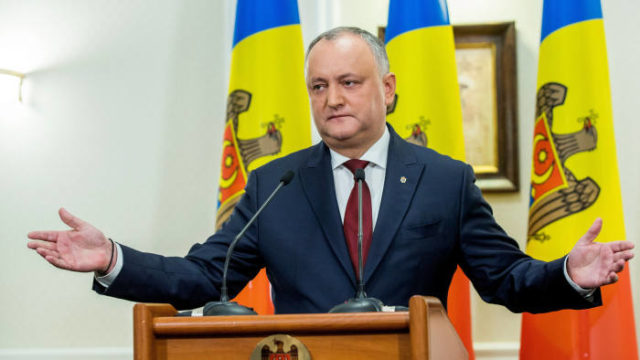
Moldova’s Leftist President Moving Steadily Toward the Political Center (Part Two)
Publication: Eurasia Daily Monitor Volume: 17 Issue: 23
By:

*To read Part One, please click here.
President Igor Dodon and his Socialist Party are governing Moldova without a parliamentary majority of their own and having to face two years of serial elections (February 2019 parliamentary elections, October 2019 country-wide local elections, November 2020 presidential elections, possibly combined with pre-term parliamentary elections). Aiming for reelection as president and at least a Socialist plurality in parliament, Dodon is leading a shift from staunchly “leftist pro-Russia” positions toward the political center (see Part One in EDM, February 13). Moldova’s political and cultural orientations are often defined as “leftist pro-Russian” versus “rightist pro-Western,” the latter overlapping uneasily with a vocal Romanian-“unionist” minority. Dodon and the Socialists have the pro-Russia Left’s vote (between one third and 40 percent of the total) firmly in hand and are moving to attract the uncommitted, “centrist” segments of the electorate.
In parallel with that electoral strategy, Dodon is instituting a “balanced foreign policy” of declarative equidistance between the West and Russia. Theoretically this harmonizes with Moldova’s constitutional neutrality. Dodon aims to reactivate Moldova’s economic and political relations with Russia (as the Socialist voter base expects); to unfreeze the European Union’s economic assistance to Moldova (conditional on the government’s reform performance—see Part One); to work with the United States, recognizing its influential role in Chisinau under all Moldovan governments, including the present one (see Part One); to slightly broaden Moldova’s relations with the North Atlantic Treaty Organization (NATO) while also exploring a more viable model for Moldova’s constitutional neutrality; as well as to bridge the domestic cultural fracture between Moldovanism and Romanianism, and work with Romania to improve the two countries’ dysfunctional relations.
– Neutrality model: On February 6, Moldova’s Foreign Affairs Minister Aureliu Ciocoi (hitherto the president’s foreign policy advisor) announced a temporary halt to the country’s quest for international recognition of its constitutional neutrality. The recognition quest would restart after attaining a national consensus in parliament and civil society about a neutrality model. On that basis, Moldova would sound out its international partners regarding the model of its neutrality (Infotag, February 6; RFE/RL, February 7).
Moldova’s permanent neutrality is self-declared in the constitution, lacking international legal standing, protected by no one, and breached on a daily basis by Russian forces in Moldova’s Transnistrian territory. President Dodon, in office since 2016, but deprived of professional staff resources, had sought security guarantees for neutral Moldova under a hypothetical agreement between Russia and Western powers. This would supposedly meet Russia’s precondition to a political settlement in Transnistria and the withdrawal of Russia’s own troops from that part of Moldova. Dodon spoke along these lines in the February 2019 Munich Security Conference. Significant upgrades to Dodon’s staff, however, enabled him to recognize that political-military neutrality could become an instrument for guarantor Russia to restrict or even block Moldova’s relations with the European Union and other Western partners. Dodon, therefore, narrowed down the proposed concept to one of “military neutrality” in his speech last year at the United Nations (see EDM, October 1, 2019). And this year, at the Munich Security just held, Dodon did not bring up the issue of Moldova’s neutrality model at all.
Prioritizing an internal consensus before moving to international negotiation on the issue of neutrality is a sequence that Dodon has already suggested on the issue of Transnistria’s special status: national consensus first, political solution (constitutional settlement) afterward. Dodon staked out that position during the cohabitation of his Socialist Party with the ACUM (“NOW”) bloc in the parliamentary majority and government (see EDM, July 18, 2019) and has apparently maintained this view since then. Moldova has taken a time-out regarding the special status as it has on neutrality, presumably awaiting the outcome of this year’s elections before moving any further.
– An opening to NATO? President Dodon had earlier gained a certain notoriety by invoking his powers to restrict Moldova’s relations with the North Atlantic Alliance to a bare minimum. In so doing, he had usually offered the strictest possible interpretation of Moldova’s neutrality but also undoubtedly played to an ill-informed voter base. He had earlier also criticized NATO’s liaison office in Chisinau, a small, purely civilian, understaffed office for public information. But an improvement seems underway, which could not have happened without a presidential green light.
On February 4, Moldovan State Secretary for Foreign Affairs Gheorghe Leuca held talks at NATO headquarters in Brussels on Moldova’s implementation of the first stage of the Defense and Related Security Capacity Building (DCB) Initiative and its attendant package. This is a NATO advice-and-assistance package to establish a national security strategy, national defense strategy, a military strategy and a force structure for Moldova. The talks in Brussels also concerned publicizing information about NATO in Moldova (Ziarul National, February 4; Nato.int, October 12, 2018, December 5, 2019). Moldova’s own defense budget, however, is reported at only 0.3 percent of GDP (Deschide.md, November 29, 2019).



